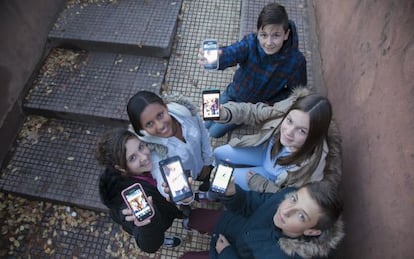Adolescence in the smartphone age
Today’s under-15s are the first generation to become teenagers with their own cellphones Many Spanish parents are floundering to control what their children do online


Thirteen-year-old Sara is upset with her parents. She believes she’s the victim of a terrible injustice. Despite her good school grades, she’s no longer allowed to use her smartphone after 11pm because she was caught sending text messages in bed in the early hours of the morning. Initially, she protested, trying everything from sulking to blackmail to get her way. At this point, I should point out that Sara is my daughter, and was a model child: always smiling, loving, and largely obedient. Then one day, she mutated into a lazy, bored and surly monster: in other words, a typical teenager.
Sara has well and truly hit puberty, and in her better moments admits to being difficult to live with sometimes. Her elder sister, Irene, now on the verge of adulthood at the age of 17 and a half, went through the same process. The difference is that while Irene’s rite of passage took place without a smartphone, and with the only computer she had access to in plain view in the living room, Sara’s is being shared with the entire planet via her smartphone, from which she refuses to be separated.
Don’t allow your kids to emotionally blackmail you by saying you’re invading their privacy” Esther Arén, head of the Spanish police’s Civic Participation Unit
Irene was born into the digital age, but had to make the transition from computer to smartphone. Sara is a child of the smartphone. Adolescence has never been easy, but the digital age has left the parents of children like Sara wondering if they did the right thing by buying them cellphones, ostensibly with the idea that they would always know where their children were. Instead, the consequence has been to make it impossible to know what they are up to, transfixed as they are all day (and night) by a screen whose contents are a mystery.
“What you have done is to give your children a brand-new BMW and let them loose on the roads unaccompanied, with no driving license or insurance,” says Esther Arén, head of the Spanish police’s Civic Participation Unit, taking a typically head-on approach to her task of raising awareness about the risks that the internet and social networks can pose to parents at a Madrid secondary school. “Your children are digital natives, unlike yourselves, so you have no idea how to manage them or establish rules. It’s not good enough. If you are going to give them a tool, you have to teach them how to use it. If you take an interest in who their friends are in real life, you have to apply the same principles to the digital sphere of their lives.”
Hyperconnected
Around a third of 10-year-olds have a cellphone. By the age of 12, the figure is 70 percent, and by 14, 83 percent.
A fifth of 11-year-olds have a social network profile. By age 12, that figure is 50 percent, and by the age of 15 on, 90 percent.
Almost 40 percent of minors upload content from the internet without their parent’s knowledge.
Around 90 percent of parents admit to not knowing what their children look at on the internet, saying they believe their children are able to “make their own decisions”.
Sources: National Statistics Institute and the Interior Ministry.
The audience of middle-class men and women sitting before her nod their heads in agreement as Arén continues her tirade: “Some of you would be shocked if you knew what your children were saying and what they were looking at. You cannot just ignore this by saying you don’t understand the social networks. You can still learn to drive at the age of 40, so talk to your children. Set guidelines and rules. Create your own online profile. Find out who your children are talking to: you’re the ones paying the phone bill and the internet connection, and don’t allow your kids to emotionally blackmail you by saying that you’re invading their privacy. They are your children, they are minors, and they are your responsibility.”
Jesús Pernas is a school principal in Madrid and the father of a 14-year-old boy. He takes a rather different view of the internet than Arén and many parents: “If the police have to come to my school to explain how the internet works, I’m doing a pretty bad job, both as an educator and a parent. What’s amazing in this country is that the internet and the social networks are not being used as part of the school curriculum right from the early stages of education; after all, they take up about 99 percent of kids’ free time.”
He disagrees with what he calls “spying” on children. “Bans and threats are simply criminalizing, a recognition that we have failed, and an invitation to our children to lie to us. They are looking for the same things as we were at that age; they’re just looking for it on the internet: love, affirmation, emotions. Children tend to be themselves on the internet, the same person they are in real life. They don’t see themselves as children, they are at that point in life when they are searching for things, and they have to make their own choices. That is where parents have to play a role. Instead, they use the digital divide as an excuse. Parents today seem to find everything too hard, too much trouble. We can’t handle our own children. You have to sit down with your children and understand their fears. You have to work with them. If you are able to win them over in real life, the same will apply in the digital world. But just taking their phones away will achieve nothing. The future is now.”
What’s amazing is that the internet is not part of the school curriculum right from the early stages of education” School principal Jesús Pernas
It’s Friday afternoon, and Sara is meeting her friends Hugo, Sauditu, Isa and Kacper, all connected by WhatsApp, in a park near their homes in the Madrid dormitory town of Alcalá de Henares.
They regularly exchange messages, swap photos and videos, and share their thoughts and feelings through emoticons, even when together. They all started out with basic cellphones a few years ago, given to them by their parents so they could be located, but today own smartphones with internet access. Aside from WhatsApp, they also have accounts on photo-sharing site Instagram, as well as Snapchat, where messages and photographs disappear after 30 seconds, and Ask, a network where users provide answers to just about any question. They are also signed up to any number of games, and social networks such as Twitter and Facebook. They rarely use their phones for talking, and highlight the importance of being connected, both to friends and the wider world.
Aside from Sara, whose parents have imposed a nighttime ban on her phone, and Hugo, who is only allowed access to his at weekends, the others are free to use their phones as they like. They all say they know people who have used swearwords to insult others on the networks – not themselves though. They all upload photos, but none of them have shared images of themselves undressed, although the latest rumor is that somebody they know sent a nude photo of herself to a boy, who then sent it out to “everybody.” They know the risks, they say, but know how to “handle” themselves online.
Sara is indignant that her mother is threatening to open an Instagram account so that she can check on what her daughter is seeing. “She doesn’t trust me. I don’t know who she thinks I am. She won’t give me even the tiniest bit of privacy,” she complains, seemingly failing to understand that anybody out there can also see her photos. Sauditu feels her pain. “I don’t want my mother seeing what I’m doing either. Imagine I upload a photo and a friend says it makes them feel horny. I know that it’s a joke, and I think it’s funny, but my mother could misinterpret it.”
Asked if he would be bothered if somebody he didn’t know said the same thing, he says he would simply block the user and delete the comment.
“My mom doesn’t trust me. I don’t know who she thinks I am. She won’t give me even the tiniest bit of privacy” Sara, 13
Life is still simple for Sara and her friends. But reality is a more complex affair. There is cyberbullying, as well as grooming by adults looking to access photos or even sex from children. Some youngsters agree to meet other users they do not know. There are cases of minors developing addiction to using social networks. There are also suicides. Some experts recommend that parents restrict their children’s use of smartphones until the age of 16, although 83 percent of Spanish children already have one by the age of 14.
The vast majority of Spanish children and teenagers use their smartphones sensibly. Some kind of parental supervision, limits, and guidelines seem like a good idea during these difficult years, as Ícaro Moyano, who used to work at Spanish social network Tuenti and is now a consultant, points out: “There are no human years on the internet, only dog years. A digital year is like five or six in real life. And three or four is equivalent to a generation.” That’s just about the distance between my two daughters, Irene and Sara.
Tu suscripción se está usando en otro dispositivo
¿Quieres añadir otro usuario a tu suscripción?
Si continúas leyendo en este dispositivo, no se podrá leer en el otro.
FlechaTu suscripción se está usando en otro dispositivo y solo puedes acceder a EL PAÍS desde un dispositivo a la vez.
Si quieres compartir tu cuenta, cambia tu suscripción a la modalidad Premium, así podrás añadir otro usuario. Cada uno accederá con su propia cuenta de email, lo que os permitirá personalizar vuestra experiencia en EL PAÍS.
¿Tienes una suscripción de empresa? Accede aquí para contratar más cuentas.
En el caso de no saber quién está usando tu cuenta, te recomendamos cambiar tu contraseña aquí.
Si decides continuar compartiendo tu cuenta, este mensaje se mostrará en tu dispositivo y en el de la otra persona que está usando tu cuenta de forma indefinida, afectando a tu experiencia de lectura. Puedes consultar aquí los términos y condiciones de la suscripción digital.








































